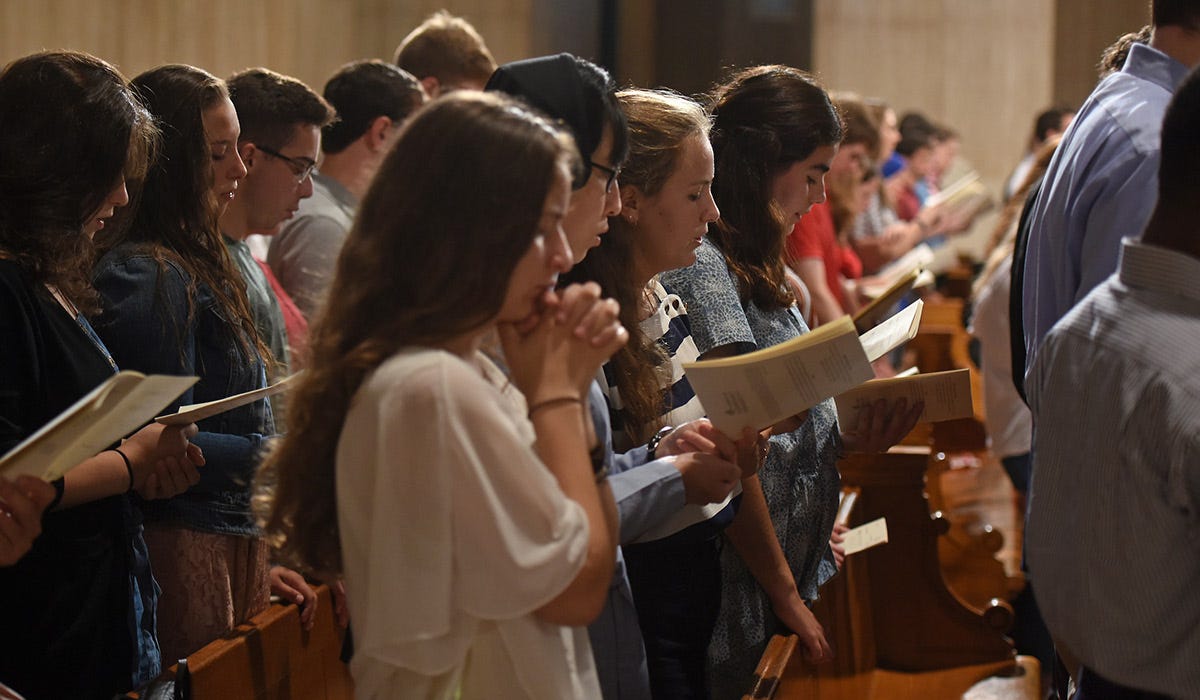Since Voltaire we have been told God is dead and the Church in just a few short years will cease to exist. But it has proved rather stubborn, living through the halcyon days of the new atheism and the many scandals that have rocked all Churches, not least our own. It seemed for a time, the narrative of a declining and inherently inconsequential faith to modern Britons was true. But something has been changing. In a recent survey published by the Bible Society looking at faith and church attendance in England and Wales since 2018 they have recorded a remarkable rise in adherence amongst 18-24 years olds:
We found that the Church is in a period of rapid growth, driven by young adults and in particular young men. Along with this, the Church demonstrates greater ethnic diversity than ever before. Both within and outside the Church, young adults are more spiritually engaged than any other living generation, with Bible reading and belief in God on the rise. But we also see that active engagement with a church has a significant impact on the lives of attenders, with a high increase in mental and general life wellbeing – again particularly among young adults, a generation in the midst of a mental health crisis.
Here are some key statistics from the report.
‘In 2018, just 4% of 18–24-year-olds said they attended church at least monthly.
Today this has risen to 16%, with young men increasing from 4% to 21%,
and young women from 3% to 12%. This is now the second most likely age
group to attend church regularly. Overall, churchgoing Christians now
make up 12% of the population, up from 8% in 2018. In numerical terms,
that’s growth from 3.7m in 2018 to 5.8m in 2024 – an increase of 56%’.
‘In addition to absolute growth in churchgoing, including among the
white population, the Church in England and Wales is also becoming
more diverse. Just under 1 in 5 churchgoers (19%) are from an ethnic
minority, but among 18–54-year-olds this rises to 1 in 3 (32%). At
the same time Catholicism has risen sharply and Pentecostalism
has become the third biggest Christian tradition, with the share of
churchgoers identifying as Anglicans dropping steadily’.
‘27% of adults say they are Christian but don’t regularly go to church,
compared to 32% in 2018’.
‘35% of 18–24-year-olds say there is ‘definitely a God/gods
or higher power’.
‘21% of men aged 18-24 are regular churchgoers’.
The report goes on to show that social activisim, connection to local communities and it relationship in helping people with their mental health have all contributed to this rise. There are however nuances in the report that should be taken into account.
The decline in people identifying as ‘Christian by default’ has not abated, with the rise of those stating they are non-religious continuing. The people affirming their faith in this report are those then who are actively choosing - and hence converting. Spiritual practices are also quite important to this age cohort, but again it is down to real adherence and not ‘just because’. When it comes to the bible, there has been a doubling in general numbers of people who read the bible, this increasing rapidly with those who actually attend church. With those who attend church, it is members of Baptist, Pentecostal and ‘new churches’ that see the greater increase. Catholic church-goers are still the least likely to read their bible in this survey.
The other thing of course about this survey is that it only relates to England and Wales. To date there are no similar surveys for Scotland, and although we could anticipate similarties, there will be differences.
What the report is showing is that we have a generation wanting to know more and be part of the community of faith. It now is down to our clergy and active lay people to respond - we need to reassess our RCIA process (how many of our Parishes have one for starters?), think about ongoing discipleship programmes, as well as increase bible literacy and confidence. The church offers many pathways for spiritual discernment and help; from rosary groups to lectio divina, as well as access to places and groups such as; Pluscarden Abbey, lay Dominican groups, Secular Franciscans, the Ignatian Spirituality Centre in Glasgow, FireCloud, Craig Lodge and many more. There are also wider parish programmes of renewal out there such as Divine Renovation. To reach out to non-believers, with the report also highlighting a greater openess of non-church attending folk to come to church if they were asked, we can use faith exploration programmes like Sycamore.
In Scotland we have imbibed of the narrative of decline but our youngest generation is baulking at it and we need to respond.
To read the report in full please click here.
By Eric Hanna

